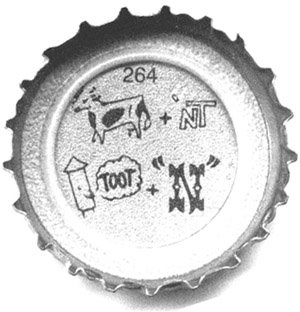Or should that be beeroglyphics?
Maybe this is the wrong place for this, but I'm stumped. Lionshead beer, a cheap but eminently drinkable Pennsylvania pilsner, has puzzles under the bottle cap. Maybe I'm just dense, but I can't solve this one:

I'm hoping that some of our vast and learned readership can help restore this bit of lost knowledge, exercising some of the skills they've acquired in the pursuit of Altertumswissenschaft.
UPDATE: I think the good professor solved the problem (see comment below): Count to 10.
And while I'm grateful, I feel a little like Ralphie in A Christmas Story, whose high hopes were dashed by the crass commercialism of the secret message he'd deciphered with the aid of his long-awaited and hard won Little Orphan Annie decoder ring: "Drink more Ovaltine."
Here the commercialism has been replaced by banality.
No, this will not do. We shall adopt the lectio difficilior, viz. bull ain't whistlin', evidently a colloquialism whose precise meaning is unrecoverable.
That's more like it.


